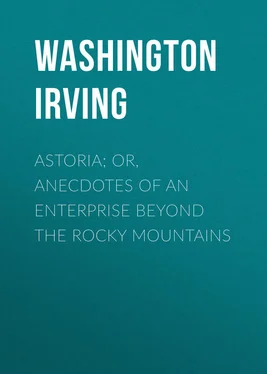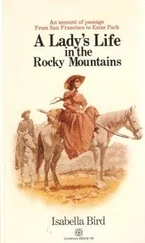Washington Irving - Astoria; Or, Anecdotes of an Enterprise Beyond the Rocky Mountains
Здесь есть возможность читать онлайн «Washington Irving - Astoria; Or, Anecdotes of an Enterprise Beyond the Rocky Mountains» — ознакомительный отрывок электронной книги совершенно бесплатно, а после прочтения отрывка купить полную версию. В некоторых случаях можно слушать аудио, скачать через торрент в формате fb2 и присутствует краткое содержание. Жанр: foreign_antique, foreign_prose, на английском языке. Описание произведения, (предисловие) а так же отзывы посетителей доступны на портале библиотеки ЛибКат.
- Название:Astoria; Or, Anecdotes of an Enterprise Beyond the Rocky Mountains
- Автор:
- Жанр:
- Год:неизвестен
- ISBN:нет данных
- Рейтинг книги:5 / 5. Голосов: 1
-
Избранное:Добавить в избранное
- Отзывы:
-
Ваша оценка:
- 100
- 1
- 2
- 3
- 4
- 5
Astoria; Or, Anecdotes of an Enterprise Beyond the Rocky Mountains: краткое содержание, описание и аннотация
Предлагаем к чтению аннотацию, описание, краткое содержание или предисловие (зависит от того, что написал сам автор книги «Astoria; Or, Anecdotes of an Enterprise Beyond the Rocky Mountains»). Если вы не нашли необходимую информацию о книге — напишите в комментариях, мы постараемся отыскать её.
Astoria; Or, Anecdotes of an Enterprise Beyond the Rocky Mountains — читать онлайн ознакомительный отрывок
Ниже представлен текст книги, разбитый по страницам. Система сохранения места последней прочитанной страницы, позволяет с удобством читать онлайн бесплатно книгу «Astoria; Or, Anecdotes of an Enterprise Beyond the Rocky Mountains», без необходимости каждый раз заново искать на чём Вы остановились. Поставьте закладку, и сможете в любой момент перейти на страницу, на которой закончили чтение.
Интервал:
Закладка:
Mr. Hunt and his coadjutor repaired, about the latter part of July, 1810, to Montreal, the ancient emporium of the fur trade where everything requisite for the expedition could be procured. One of the first objects was to recruit a complement of Canadian voyageurs from the disbanded herd usually to be found loitering about the place. A degree of jockeyship, however, is required for this service, for a Canadian voyageur is as full of latent tricks and vice as a horse; and when he makes the greatest external promise, is prone to prove the greatest “take in.” Besides, the Northwest Company, who maintained a long established control at Montreal, and knew the qualities of every voyageur, secretly interdicted the prime hands from engaging in this new service; so that, although liberal terms were offered, few presented themselves but such as were not worth having.
From these Mr. Hunt engaged a number sufficient, as he supposed, for present purposes; and, having laid in a supply of ammunition, provisions, and Indian goods, embarked all on board one of those great canoes at that time universally used by the fur traders for navigating the intricate and often-obstructed rivers. The canoe was between thirty and forty feet long, and several feet in width; constructed of birch bark, sewed with fibres of the roots of the spruce tree, and daubed with resin of the pine, instead of tar. The cargo was made up in packages, weighing from ninety to one hundred pounds each, for the facility of loading and unloading, and of transportation at portages. The canoe itself, though capable of sustaining a freight of upwards of four tons, could readily be carried on men’s shoulders. Canoes of this size are generally managed by eight or ten men, two of whom are picked veterans, who receive double wages, and are stationed, one at the bow and the other at the stern, to keep a look-out and to steer. They are termed the foreman and the steersman. The rest, who ply the paddles, are called middle men. When there is a favorable breeze, the canoe is occasionally navigated with a sail.
The expedition took its regular departure, as usual, from St. Anne’s, near the extremity of the island of Montreal, the great starting-place of the traders to the interior. Here stood the ancient chapel of St. Anne, the patroness of the Canadian voyageurs; where they made confession, and offered up their vows, previous to departing on any hazardous expedition. The shrine of the saint was decorated with relics and votive offerings hung up by these superstitious beings, either to propitiate her favor, or in gratitude for some signal deliverance in the wilderness. It was the custom, too, of these devout vagabonds, after leaving the chapel, to have a grand carouse, in honor of the saint and for the prosperity of the voyage. In this part of their devotions, the crew of Mr. Hunt proved themselves by no means deficient. Indeed, he soon discovered that his recruits, enlisted at Montreal, were fit to vie with the ragged regiment of Falstaff. Some were able-bodied, but inexpert; others were expert, but lazy; while a third class were expert and willing, but totally worn out, being broken-down veterans, incapable of toil.
With this inefficient crew he made his way up the Ottawa River, and by the ancient route of the fur traders, along a succession of small lakes and rivers, to Michilimackinac. Their progress was slow and tedious. Mr. Hunt was not accustomed to the management of “voyageurs,” and he had a crew admirably disposed to play the old soldier, and balk their work; and ever ready to come to a halt, land, make a fire, put on the great pot, and smoke, and gossip, and sing by the hour.
It was not until the 22d of July that they arrived at Mackinaw, situated on the island of the same name, at the confluence of – lakes Huron and Michigan. This famous old French trading post continued to be a rallying point for a multifarious and motley population. The inhabitants were amphibious in their habits, most of them being, or having been voyageurs or canoe men. It was the great place of arrival and departure of the southwest fur trade. Here the Mackinaw Company had established its principal post, from whence it communicated with the interior and with Montreal. Hence its various traders and trappers set out for their respective destinations about Lake Superior and its tributary waters, or for the Mississippi, the Arkansas, the Missouri, and the other regions of the west. Here, after the absence of a year, or more, they returned with their peltries, and settled their accounts; the furs rendered in by them being transmitted in canoes from hence to Montreal. Mackinaw was, therefore, for a great part of the year, very scantily peopled; but at certain seasons the traders arrived from all points, with their crews of voyageurs, and the place swarmed like a hive.
Mackinaw, at that time, was a mere village, stretching along a small bay, with a fine broad beach in front of its principal row of houses, and dominated by the old fort, which crowned an impending height. The beach was a kind of public promenade where were displayed all the vagaries of a seaport on the arrival of a fleet from a long cruise. Here voyageurs frolicked away their wages, fiddling and dancing in the booths and cabins, buying all kinds of knick-knacks, dressing themselves out finely, and parading up and down, like arrant braggarts and coxcombs. Sometimes they met with rival coxcombs in the young Indians from the opposite shore, who would appear on the beach painted and decorated in fantastic style, and would saunter up and down, to be gazed at and admired, perfectly satisfied that they eclipsed their pale-faced competitors.
Now and then a chance party of “Northwesters” appeared at Mackinaw from the rendezvous at Fort William. These held themselves up as the chivalry of the fur trade. They were men of iron; proof against cold weather, hard fare, and perils of all kinds. Some would wear the Northwest button, and a formidable dirk, and assume something of a military air. They generally wore feathers in their hats, and affected the “brave.” “Je suis un homme du nord!” – “I am a man of the north,” – one of these swelling fellows would exclaim, sticking his arms akimbo and ruffling by the Southwesters, whom he regarded with great contempt, as men softened by mild climates and the luxurious fare of bread and bacon, and whom he stigmatized with the inglorious name of pork-eaters. The superiority assumed by these vainglorious swaggerers was, in general, tacitly admitted. Indeed, some of them had acquired great notoriety for deeds of hardihood and courage; for the fur trade had Its heroes, whose names resounded throughout the wilderness.
Such was Mackinaw at the time of which we are treating. It now, doubtless, presents a totally different aspect. The fur companies no longer assemble there; the navigation of the lake is carried on by steamboats and various shipping, and the race of traders, and trappers, and voyageurs, and Indian dandies, have vapored out their brief hour and disappeared. Such changes does the lapse of a handful of years make in this ever-changing country.
At this place Mr. Hunt remained for some time, to complete his assortment of Indian goods, and to increase his number of voyageurs, as well as to engage some of a more efficient character than those enlisted at Montreal.
And now commenced another game of Jockeyship. There were able and efficient men in abundance at Mackinaw, but for several days not one presented himself. If offers were made to any, they were listened to with a shake of the head. Should any one seem inclined to enlist, there were officious idlers and busybodies, of that class who are ever ready to dissuade others from any enterprise in which they themselves have no concern. These would pull him by the sleeve, take him on one side, and murmur in his ear, or would suggest difficulties outright.
Читать дальшеИнтервал:
Закладка:
Похожие книги на «Astoria; Or, Anecdotes of an Enterprise Beyond the Rocky Mountains»
Представляем Вашему вниманию похожие книги на «Astoria; Or, Anecdotes of an Enterprise Beyond the Rocky Mountains» списком для выбора. Мы отобрали схожую по названию и смыслу литературу в надежде предоставить читателям больше вариантов отыскать новые, интересные, ещё непрочитанные произведения.
Обсуждение, отзывы о книге «Astoria; Or, Anecdotes of an Enterprise Beyond the Rocky Mountains» и просто собственные мнения читателей. Оставьте ваши комментарии, напишите, что Вы думаете о произведении, его смысле или главных героях. Укажите что конкретно понравилось, а что нет, и почему Вы так считаете.












